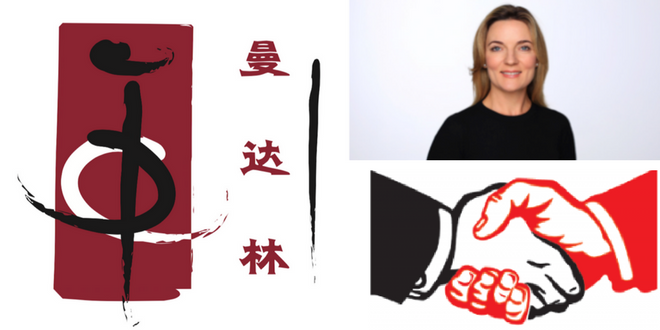Inna Gehrt of Mandarin Capital Partners on access to the Chinese market for German SMEs
(The following is a summary on an interview with Inna Gehrt, head of German Office at Mandarin Capital Partners, published in M&A Dialogue on November 28, 2017.)
Tapping the Chinese sales market remains a challenge for many German SME. It takes time and money to establish the necessary market expertise and sales networks. An interesting option in tackling these issues is the cooperation with a specialized private equity investor.
Mandarin Capital Partners was founded in 2007 with the clear focus on Europe-to-China, offering its portfolio companies far more than just the necessary funds for an expansion. Rather, we are offering “intelligent money”, advising our companies on the ground in China. To this aim we have established a knowledgeable team in China who are well-networked and help avoid pitfalls.
For instance, our team help with identifying sales partners or acquisition targets, including the respective negotiations, with setting up a production site in China or hiring the right management with local expertise and solid mastery of the English language.
It is important for success that both are working in the same direction, i. e. that entrepreneurs and investors pursue the same goals. Our success can be measured: MCP’s portfolio companies have achieved an average sales growth of 90% following the participation of MCP and other investments. Exports to China have increased sixfold on average.
Private Equity is becoming more and more attractive
A study by PwC this year shows that 83% of the family-owned companies surveyed can meanwhile envisage the participation of financial investors. In the same survey six years ago, it was only 18%. The positive overall picture that many family-owned companies now have of private equity also fits in well with this. According to this study, 72% of respondents believe that financial investors are improving the companies they acquire operationally. 61% approve of companies in which the company has a stake with the aim of achieving sustainable corporate success.
In my opinion, SMEs in particular need private equity: according to a current KfW study, about 620,000 SMEs plan to hand over or sell their companies to family members by 2018. However, finding a suitable successor is becoming increasingly difficult due to the declining number of founders. In addition, according to the BVK industry association, small and medium-sized companies in particular are supported by private equity investors: 96% of the companies financed in 2015 employed fewer than 500 people.
Companies can usually raise considerably more capital with private equity than with a bank loan and are usually too small to borrow on the capital market. We can also dispel any possible doubts by showing in detail how we have been supporting SMEs in their expansion into China since 2007 and how they can benefit from this.
Success via specialization
MCP invests mainly in its niche market of leading, export-oriented European SMEs wishing to enter or strengthen the Chinese market for the first time. This concerns production companies, especially B2B industries such as automation technology, component construction or fine chemicals. The healthcare industry is also very interesting for us, as we also have extensive expertise in this field, especially in the CMO, API, MedTech and MedIT segments. In other words, these are basically sectors in which the products contribute to higher efficiency and higher customer quality.
In China, we have five local colleagues with many years of investment experience – including at EXIM Bank and the World Bank – who have successfully supported twelve medium-sized companies in China since 2007. Through its many years of work, the China team has very good relations with the key authorities, both nationally and locally. This makes it possible to accelerate approval or certification processes that would otherwise take a very long time in China. However, there are also good and long-standing relationships with numerous industrial companies.
Geographically, the locations with the greatest potential for foreign companies are cities on the east coast around Shanghai, Guangdong and Fujian and their provinces.
Example: Gasket International
A good example of how we work is Gasket International, located near Milan, a manufacturer of valve and sealing components that are primarily used in oil and gas pipelines. In 2007, the family-owned company was at a crossroads: the competition expanded to Asia with all its strength, while the owner family was busy with the unresolved issue of succession. Important customers shifted parts of their production to China, thus further increasing the pressure. The family decided to bring another investor on board to help them find solutions for the upcoming problems such as increasing competition and the necessary product portfolio renewal. However, the family did not want to sell the company completely. One option was to sell part of the shares to a private equity investor.
At the auction, MCP was awarded the contract due to its international positioning and expertise in China. The takeover was designed as a leveraged buy-out. In other words, MCP financed the acquisition partly with a loan from a bank, albeit a very moderate one. The Grenelli family was able to reinvest the sales proceeds and acquired a 30% stake. This way, MCP enabled the family to continue to participate in increasing the company’s value.
MCP appointed a new CEO who combined a technical background with experience in the private equity sector and acquired a significant equity stake in the company. With the support by MCP, Gasket immediately entered the Chinese market, hired a Chinese CEO and founded the subsidiary Gasket China. A plant in Suzhou was opened just nine months after the closing of the transaction in December 2009. Within just three years, sales in the People’s Republic grew rapidly to just under EUR 18 million. MCP introduced Gasket to many new customers – such as Petrochina – who quickly made up a high proportion of sales. The Chinese plant finally became a good springboard for the US market, which was initially supplied from China.
In Italy, MCP also supported Gasket in a joint venture for the production of special balls. This was taken over completely in 2012. This business unit generated additional sales of EUR 10 million in 2012 alone. In total, sales rose from EUR 33 million before our investment to EUR 74 million at the time of the sale in July 2013, and Gasket was sold to the French industrial company Hutchinson SA, which in turn belongs to the French group Total. EBITDA at the time of exit was double the entry level EBITDA. The family sold its shares together with MCP to Hutchinson, thus participating in the increase in value due to strong growth in China. Gasket continues to be an independent part of the Total Group and is very active in China.
Article in PDF
Here the link to the Chinese version




















Lascia un commento